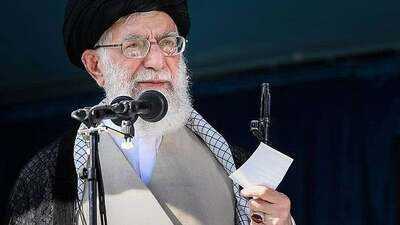
Iran's supreme leader said on Friday, 7 February, that negotiations with America “are not intelligent, wise or honourable” after US president Donald Trump floated nuclear talks with Tehran.
Ayatollah Ali Khamenei also suggested that “there should be no negotiations with such a government”, but stopped short of issuing a direct order not to engage with Washington.
Khamenei's remarks to air force officers in Tehran appeared to contradict his own earlier remarks that opened the door to talks. However, the 85-year-old Khamenei has always carefully threaded his remarks about negotiating with the West.
For months before and after the US election that saw Trump reclaim the White House, Iranian officials appeared to be signalling that they are waiting for a message from Trump on whether he wants to negotiate over Tehran's rapidly advancing nuclear programme. At stake are potentially billions of dollars withheld from Iran through crushing sanctions and the future of a programme on the precipice of enriching weapons-grade uranium.
For his part, even when signing an executive order to reimpose his “maximum pressure on Iran” on Tuesday, 6 February, Trump suggested he wanted to deal with Tehran.
“I'm going to sign it, but hopefully we're not going to have to use it very much,” he said from the Oval Office. “We will see whether or not we can arrange or work out a deal with Iran.”
“We don't want to be tough on Iran. We don't want to be tough on anybody,” Trump added. “But they just can't have a nuclear bomb.”
Trump followed with another online message on Wednesday, saying: ‘Reports that the United States, working in conjunction with Israel, is going to blow Iran into smithereens, ARE GREATLY EXAGGERATED.’
‘I would much prefer a Verified Nuclear Peace Agreement, which will let Iran peacefully grow and prosper,’ Trump wrote on Truth Social. ‘We should start working on it immediately, and have a big Middle East Celebration when it is signed and completed.’
Trump did not elaborate.
Earlier in the week, Trump also said that displaced Palestinians in Gaza could be permanently resettled outside the war-torn territory and proposed the US take ‘ownership’ in redeveloping the area into ‘the Riviera of the Middle East’.
While not directly linking Trump's comments on Gaza, Khamenei appeared to be referencing them in his remarks as well.
“The Americans sit, redrawing the map of the world — but only on paper, as it has no basis in reality," Khamenei said. “They make statements about us, express opinions and issue threats. If they threaten us, we will threaten them in return. If they act on their threats, we will act on ours. If they violate the security of our nation, we will, without a doubt, respond in kind.”
A day ago, on Thursday, 6 February, the US department of treasury imposed sanctions on a network of more than a dozen people and firms that are accused of facilitating the shipment of millions of barrels of Iranian oil to China.
The department's Office of Foreign Assets Control sanctioned more than a dozen people and companies in China, India and the United Arab Emirates. The targets include Iranian and Indian citizens, crew management firms and a collection of ships.
‘The Iranian regime remains focused on leveraging its oil revenues to fund the development of its nuclear programme, to produce its deadly ballistic missiles and unmanned aerial vehicles, and to support its regional terrorist proxy groups,’ said treasury secretary Scott Bessent in a news release.
During his confirmation hearing, Bessent criticised the Biden administration’s sanctions policies and called for the US to have a more ‘muscular’ sanctions regime, including on Iran and Russian entities and oil.
Tammy Bruce, a state department spokeswoman, said in a statement on Thursday that the US ‘will use all tools at our disposal to hold the regime accountable for its destabilising activities and pursuit of nuclear weapons that threaten the civilized world’.
While signing an executive order on Tuesday mandating the US government to impose maximum pressure on Tehran, president Donald Trump told reporters that he’d given his advisers instructions to ‘obliterate’ Iran if it assassinates him.
Following that executive order, Iran's currency plunged to a record low of 850,000 rials to USD 1 on Wednesday, 5 February.
Trump's order, signed Tuesday night, calls for halting Iran's oil exports and pursuing a ‘snapback’ of the United Nations sanctions on Iran. However, he also suggested he didn't want to impose those sanctions and wanted to reach a deal with Iran.
The move came as Trump's moves to freeze spending on foreign aid and overhaul — or even end — the US Agency for International Development (USAID) were lauded in Iranian state media.
Iranian officials had at the time appeared to be signalling that they were waiting for a message from Trump on whether he wanted to negotiate over Tehran's rapidly advancing nuclear programme.
AP